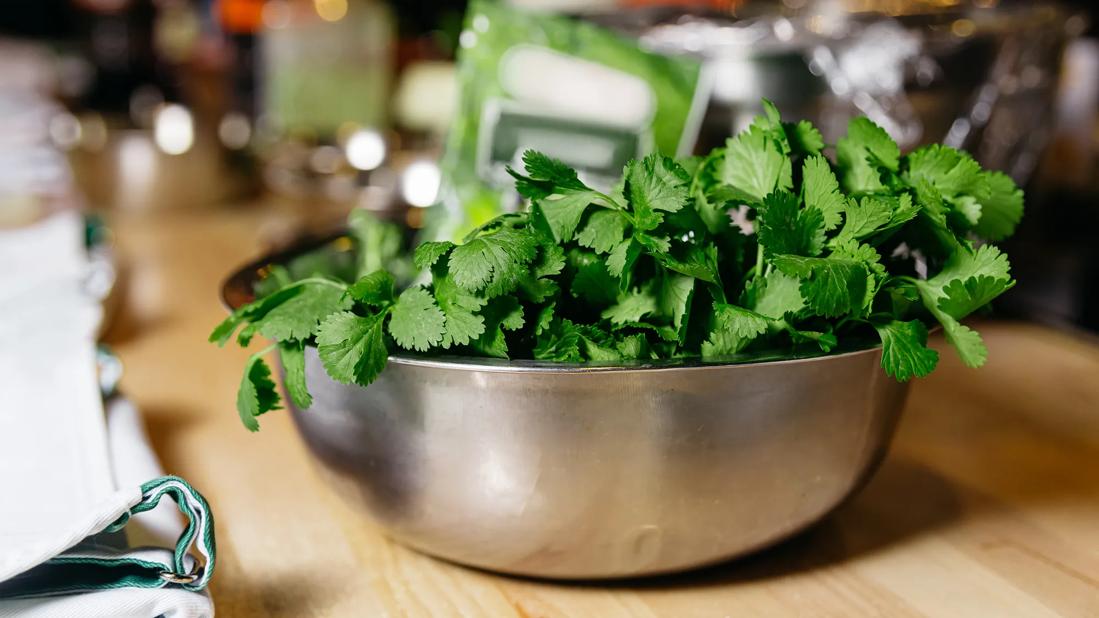The OR6A2 gene could be behind your dislike of this herb — but with time, your brain may be convinced to like it

Image content: This image is available to view online.
View image online (https://assets.clevelandclinic.org/transform/869dabc7-b72b-4901-82f8-a0aa69f234ba/cilantro-leaves-bowl-2007267217)
Cilantro in a metal bowl in kitchen
Freshly cut herbs can brighten up every recipe and add a burst of flavor to any dish. But for some people, one common herb can produce a distinctly negative reaction: cilantro.
Advertisement
Cleveland Clinic is a non-profit academic medical center. Advertising on our site helps support our mission. We do not endorse non-Cleveland Clinic products or services. Policy
Family medicine specialist Neha Vyas, MD, says cilantro (Coriandrum sativum) is one of the most polarizing herbs used in modern cooking. Why? Because to some people, cilantro tastes like soap — and there’s a scientific reason for it.
If you can’t stand the taste of cilantro, your genes may be to blame. You likely have a specific gene called OR6A2 that makes you super-sensitive to a component of this herb — and, yes, can make it taste like soap.
“Those who dislike cilantro tend to have this gene, which detects the aldehyde part of cilantro as a soapy smell and taste,” Dr. Vyas explains.
Aldehydes are organic materials with a distinct chemical structure. The pairing of a carbon atom with an oxygen atom leaves room for two more bonds. If one of those bonds is with a hydrogen atom, it’s called an aldehyde; if neither of the bonds is with hydrogen, it becomes a ketone.
It’s OK if you can’t quite follow that science. The gist is this: It’s a very small molecular difference that has big implications for your sense of smell. This gene can cause you to perceive the scent of cilantro as soapy — and the way things smell influences the way they taste.
“Researchers suspect that a dislike for cilantro is largely driven by the way it smells,” Dr. Vyas says.
Advertisement
Most people don’t have the OR6A2 gene — and to them, cilantro tastes pretty normal. But one study found that anywhere from 3% to 21% of people can’t stand cilantro. Women were slightly more likely than men to perceive a soapy taste.
The same study showed that people of Black, Latino, East Asian and South Asian descent were much less likely to detect a soapy taste than people of European descent. Some of that may be due to cultural influence, as many global cuisines — including Thai, Mexican and Indian — use cilantro as a staple ingredient in everyday dishes.
The way cilantro smells and tastes to you may be based on your genes. But there’s an important catch.
“Unlike other fixed genetic traits, like eye or hair color, your cilantro preference can be changed by environmental factors,” Dr. Vyas says.
That’s right. Over time, your brain can actually overcome its genetic predisposition toward disliking cilantro.
Having good experiences with cilantro can eventually change your brain’s perception of it. For example, sharing a joyful meal with loved ones may allow you to update or change your negative associations with the herb.
“One day, you might flip from not liking it at all to really loving it,” she says.
Want to try to persuade your brain to like cilantro? Start enjoying some meals with friends and family using this helpful food prep trick: “Some people say that crushing cilantro leaves before using them helps diminish the soapy taste,” Dr. Vyas suggests.
But it’s also OK if you can’t be convinced. These cilantro alternatives may be more up your alley:
Next time you’re grocery shopping, pick up one of these flavorsome substitutes — or consider giving cilantro another try. With time, you might just come to love it!
Advertisement

Sign up for our Health Essentials emails for expert guidance on nutrition, fitness, sleep, skin care and more.
Learn more about our editorial process.
Advertisement
This evolving technology may one day eliminate conditions like sickle cell anemia and hemophilia
Genetic markers can determine if you’ll develop Huntington’s disease or pass it on to your children
Why both nature and nurture matter
Testing MTHFR is usually unnecessary
The short answer from a genetic counselor
Know the pros and cons
Spoiler alert: Taste buds change more often than you might think
High cholesterol can be genetic, but testing and treatment can lower your heart disease risk
Although it could be used as a moisturizer, this new trend is not recommended
Communicating clear limits helps protect your time, energy and emotional well-being
High cholesterol can be genetic, but testing and treatment can lower your heart disease risk